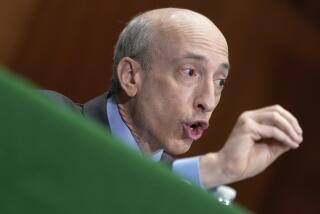SEC Seeks to Separate Banks, Brokers
- Share via
WASHINGTON — The Securities and Exchange Commission proposed a rule Monday that seeks to eliminate customer confusion about mutual funds sold on bank premises.
NationsBank Corp., the country’s fourth-largest banking company, and First Union Corp., the ninth-largest, are under SEC investigation for allegedly misrepresenting the risks of mutual funds sold at their banks. Both companies have denied any wrongdoing.
The 65-page proposal, which invites public comment over the next two months, would require brokerage firms to sell securities in a location separate from the main banking area.
The firms would also have to explain to customers the differences in risk between securities such as mutual funds and bank products such as certificates of deposit. Finally, firms would be barred from paying customer-referral fees to unregistered bank employees.
The plan incorporates a proposal submitted late last year by the National Assn. of Securities Dealers, the self-regulatory body that polices all U.S. brokers.
“The idea is to eliminate investor confusion when they come into a bank and see a chart of mutual fund returns going up,” said Elliott Curzon, NASD associate general counsel. “Before they make a purchase, they should know the funds are not federally insured and can go down as well as up.”
The SEC declined to comment. The plan would affect about 4,000 banks that offer investment products to their customers, the American Bankers Assn. has estimated.
The ABA said it will oppose the part of the plan that limits fees paid to banking employees for referring securities business to bank brokers.
A part of the proposal added since its submission by the NASD would discourage the use of brokers at banks’ increasingly popular supermarket kiosks. Regulatory judgment on the legality of these arrangements would be made on a case-by-case basis.
The number of bank facilities at supermarkets grew 25% last year to 3,142, according to International Banking Technologies, which provides data and other services for the banking industry. The number is expected to double in the next four years because of their convenience and cost advantages, an IBT spokesman said.
More to Read
Inside the business of entertainment
The Wide Shot brings you news, analysis and insights on everything from streaming wars to production — and what it all means for the future.
You may occasionally receive promotional content from the Los Angeles Times.










